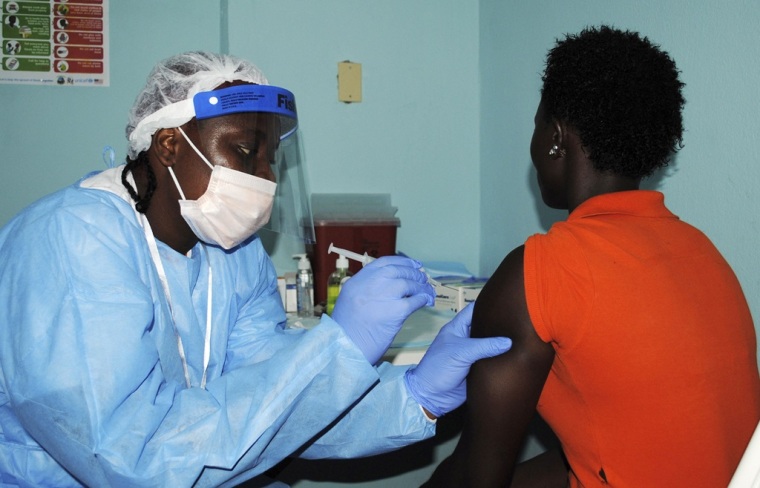Ebola Outbreak News 2015: Cases Rise In West Africa As Virus Wipes Out 20 Percent Of Sierra Leone's Surgeons

The World Health Organization has revealed that new cases of the Ebola virus have risen for the first time this year on the three most affected West African countries – Sierra Leone, Guinea and Liberia.
At the same time, Sierra Leone has disclosed that 20 percent, or about 500, of its surgeons have died from the epidemic since it began last year, according to a January report by the W.H.O. The world health body said the continuing deaths of health care workers will have devastating implications for the long-term health of the people of Sierra Leone as well as those from other Ebola-ravaged countries in Africa.
Sierra Leone reported 80 new confirmed cases in the week that ended Feb. 1, higher than the 65 cases in the previous week, according to the W.H.O., according to a Bloomberg report last Thursday. There were 39 cases in Guinea from 30, and five in Liberia from four.
The upward shift in the number of cases highlights the concerns of public health workers that the virus will return if the effort to contain it abates.
Remote areas will be harder for aid workers to reach as the wet season nears, the W.H.O. stated. While some communities still resist help, the virus continues to fan out to more areas of Guinea.
Sierra Leone's western part, including the capital Freetown and the Port Loko district, still suffers from "intense transmission," the world health body said.
Meanwhile, there are less than 10 remaining surgeons for around six million people in Sierra Leone amid the battle against Ebola, Scientific American reported last month.
Over 800 health care workers have been infected with the virus in the hot zone while almost 500 have died since the start of the epidemic, the Journal said, citing a W.H.O. report.
According to the W.H.O., surgery, called the "'neglected component' of healthcare," can be used to treat 11 percent of the disease burden worldwide.
With the death of hundreds of surgeons in Sierra Leone, the surviving surgeons have been frozen by fear of contracting the deadly disease, considering the chances of getting the virus are 100 percent higher for doctors than the public at large.
In Sierra Leone, 25 percent of deaths could be averted with surgery. Around 1.5 million people in the country need surgical consultations, mostly for burn injuries and wounds.
Sierra Leone's public health and medical infrastructure, however, has already been devastated by decades of civil war, making it vulnerable to epidemics.
Volunteer surgeons continue to work in Sierra Leone but only for a few months at a time.
Sierra Leone also faces the problem of brain drain as some of its doctors seek employment in other countries not suffering from the Ebola plague and where they can have a better income.
"I want to retire soon," 60-year-old Sierra Leone doctor Thaim Kamara, who is also worried about his sick mother, told the Scientific American. "But I don't think I can. Some of the eight [remaining surgeons] have actually retired but they come back to work because we desperately need them."
 Christians don't have to affirm transgenderism, but they can’t express that view at work: tribunal
Christians don't have to affirm transgenderism, but they can’t express that view at work: tribunal Archaeology discovery: Medieval Christian prayer beads found on Holy Island
Archaeology discovery: Medieval Christian prayer beads found on Holy Island Presbyterian Church in America votes to leave National Association of Evangelicals
Presbyterian Church in America votes to leave National Association of Evangelicals Over 50 killed in 'vile and satanic' attack at Nigerian church on Pentecost Sunday
Over 50 killed in 'vile and satanic' attack at Nigerian church on Pentecost Sunday Ukrainian Orthodox Church severs ties with Moscow over Patriarch Kirill's support for Putin's war
Ukrainian Orthodox Church severs ties with Moscow over Patriarch Kirill's support for Putin's war Islamic State kills 20 Nigerian Christians as revenge for US airstrike
Islamic State kills 20 Nigerian Christians as revenge for US airstrike Man who served 33 years in prison for murder leads inmates to Christ
Man who served 33 years in prison for murder leads inmates to Christ


 Nigerian student beaten to death, body burned over ‘blasphemous’ WhatsApp message
Nigerian student beaten to death, body burned over ‘blasphemous’ WhatsApp message 'A new low': World reacts after Hong Kong arrests 90-year-old Cardinal Joseph Zen
'A new low': World reacts after Hong Kong arrests 90-year-old Cardinal Joseph Zen Iran sentences Christian man to 10 years in prison for hosting house church worship gathering
Iran sentences Christian man to 10 years in prison for hosting house church worship gathering French Guyana: Pastor shot dead, church set on fire after meeting delegation of Evangelicals
French Guyana: Pastor shot dead, church set on fire after meeting delegation of Evangelicals ‘Talking Jesus’ report finds only 6% of UK adults identify as practicing Christians
‘Talking Jesus’ report finds only 6% of UK adults identify as practicing Christians Mission Eurasia ministry center blown up in Ukraine, hundreds of Bibles destroyed: 'God will provide'
Mission Eurasia ministry center blown up in Ukraine, hundreds of Bibles destroyed: 'God will provide' Church holds service for first time after ISIS desecrated it 8 years ago
Church holds service for first time after ISIS desecrated it 8 years ago Burger King apologizes for 'offensive campaign' using Jesus' words at the Last Supper
Burger King apologizes for 'offensive campaign' using Jesus' words at the Last Supper Uganda: Muslims abduct teacher, burn him inside mosque for praying in Christ’s name
Uganda: Muslims abduct teacher, burn him inside mosque for praying in Christ’s name